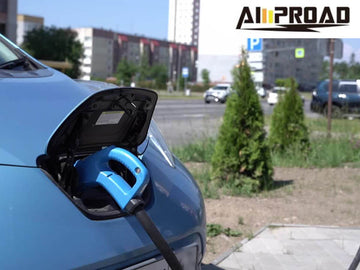
As electric vehicles (EVs) continue to gain popularity, understanding the associated terminology is essential for anyone interested in this rapidly evolving technology. This guide will help you navigate the key terms and concepts related to electric vehicles, covering everything from types of EVs to charging infrastructure.
General EV Terminology
BEV (Battery Electric Vehicle): A vehicle powered solely by a battery and an electric motor, without a gasoline engine. BEVs are known for their zero-emissions capability since they don't rely on fossil fuels at all. Popular examples include the Tesla Model S and the Nissan Leaf.
PHEV (Plug-in Hybrid Electric Vehicle): A vehicle that combines an electric motor with a gasoline engine. PHEVs can be plugged in to charge the battery but can also run on gasoline, providing flexibility for longer trips. Examples include the Chevrolet Volt and the Toyota Prius Prime.
HEV (Hybrid Electric Vehicle): A vehicle with both an electric motor and a gasoline engine. Unlike PHEVs, HEVs cannot be plugged in; their batteries are charged by the gasoline engine and regenerative braking. The Toyota Prius is a well-known HEV.
EVSE (Electric Vehicle Supply Equipment): EVSE encompasses all the equipment needed to deliver electric power from the utility to an EV, including home chargers and public charging stations.
EVCS (Electric Vehicle Charging Station): EVCS specifically refers to locations equipped with chargers for EVs, ranging from single chargers in homes to multiple units in public and commercial areas.
Kilowatt (kW): A measurement of power, indicating the rate at which energy is used or generated. For EVs, it often describes the charging rate. A higher current means a higher kW rating, and typically means a faster charge. For example, when using AMPROAD adjustable amperage max 40-amp EV charger, the EV can be charged faster when you setup 40A (9.6 kW) than 32A (7.6 kW).
Kilowatt-Hours (kWh): A measurement of energy capacity, indicating the total amount of energy a battery can store. For example, a 60 kWh battery can theoretically provide 60 kW of power for one hour or 1 kW for 60 hours.
Alternating Current (AC): A type of electrical current in which the flow of electric charge periodically reverses direction. AC is the standard form of electricity delivered by the grid and used in homes.
Direct Current (DC): A type of electrical current in which the flow of electric charge is in one constant direction. Batteries, including those in EVs, store and discharge DC power.
Charging Network: A system of interconnected charging stations allowing EV owners to recharge their vehicles at various locations, often managed by companies like Tesla, ChargePoint, or Electrify America.
Range: The distance an EV can travel on a single charge. This varies based on factors like driving conditions, speed, and battery capacity.
Battery Capacity: Measured in kWh, it indicates the total amount of energy a battery can hold, directly impacting the vehicle's range.
Charging Speed: Refers to the rate at which an EV battery can be charged. Faster charging speeds reduce the time needed to recharge the vehicle.
Level 1 Charging: The slowest charging method, typically using a standard household outlet (120V). It adds about 2-5 miles of range per hour of charging.
Level 2 Charging: Faster than Level 1, it uses a 240V outlet, like those used for large home appliances. A level 2 EV charger typically adds 10-60 miles of range per hour, making it suitable for home and public charging stations.
DC Fast Charging: The fastest charging method, using direct current to provide rapid charging. It can add 60-200 miles of range in about 20-30 minutes, making it ideal for long trips.
Regenerative Braking: A technology that recovers energy during braking and converts it back into stored energy in the battery, improving overall efficiency.
EV Battery Terminology
Lithium-ion Battery: The most common type of battery used in EVs due to its high energy density and long lifespan. These batteries are efficient and can be recharged many times before their capacity starts to degrade.
Battery Degradation: The gradual loss of battery capacity over time and use. Factors such as high temperatures, frequent fast charging, and deep discharges can accelerate degradation.
Battery Management System (BMS): A system that monitors and manages the health and safety of the battery. It controls charging and discharging, monitors temperature, and ensures the battery operates within safe parameters.
Public Charging Terminology
Charging Station: A location equipped with one or more EV chargers. These can range from simple setups with a single charger to large installations with multiple high-speed chargers.
Charging Port: The socket on an EV where the charging cable is connected. Different EVs may have different types of ports, but common standards include CCS, CHAdeMO, and Tesla's proprietary connector.
Charging Connector: The plug on the charging cable that connects to the EV's charging port. Examples include the CCS Combo 1 and Type 2 connectors.
Public Charging Network: A system of charging stations operated by various companies or organizations, often accessible through a membership or app. Networks like ChargePoint, EVgo, and Tesla Superchargers are common in the U.S.
Additional Terms
EV Infrastructure: The network of charging stations, battery recycling facilities, and other necessary elements that support the widespread adoption of EVs. This includes both private and public charging solutions.
EV Tax Credit: A government incentive that provides financial benefits to reduce the purchase price of a new EV. In the U.S., federal tax credits up to $7,500 are available, with additional incentives at the state level.
Zero-Emission Vehicle (ZEV): A vehicle that produces no tailpipe emissions. This includes EVs and hydrogen fuel cell vehicles, which are essential for reducing air pollution and combating climate change.
Understanding these terms is crucial as the electric vehicle industry continues to grow. Whether you're a prospective EV owner or just interested in the technology, this knowledge will help you navigate the evolving landscape of electric transportation.


